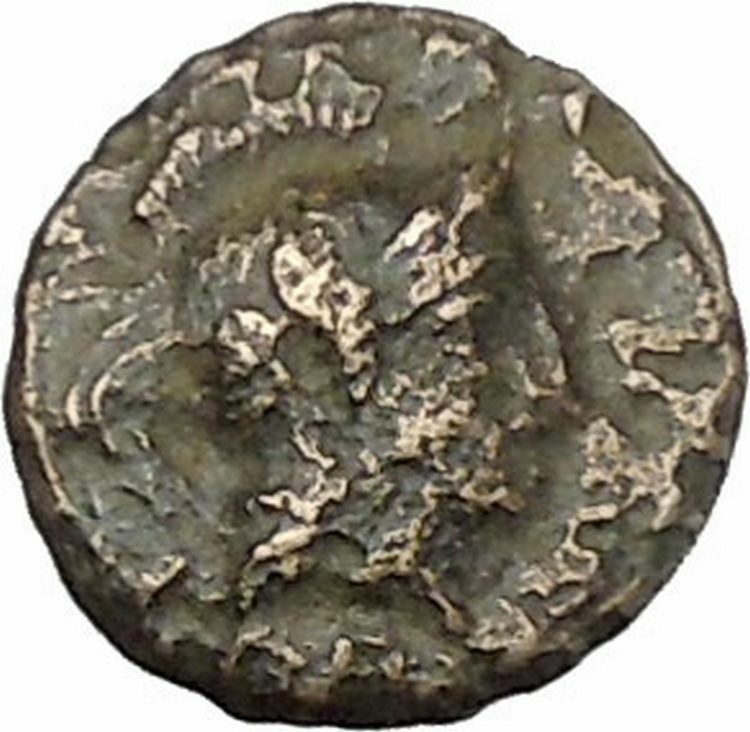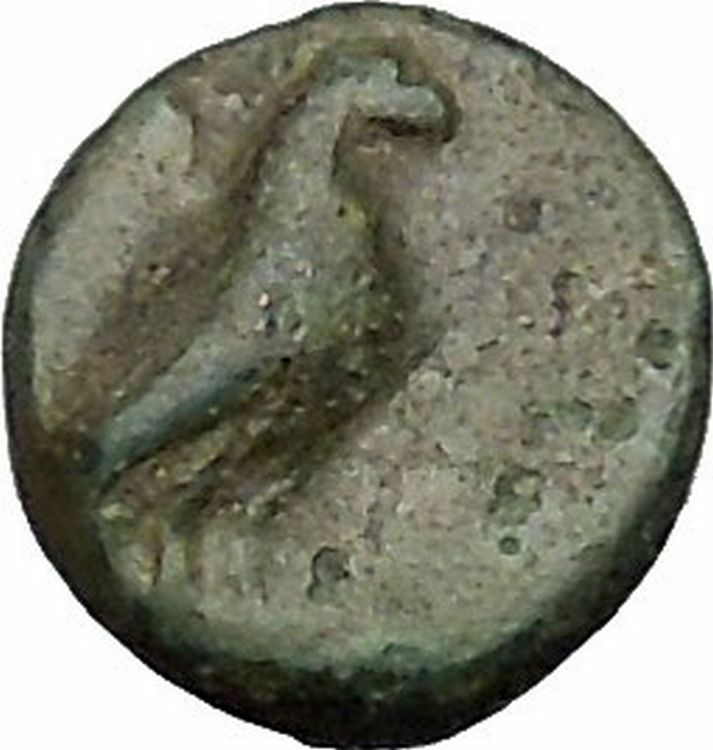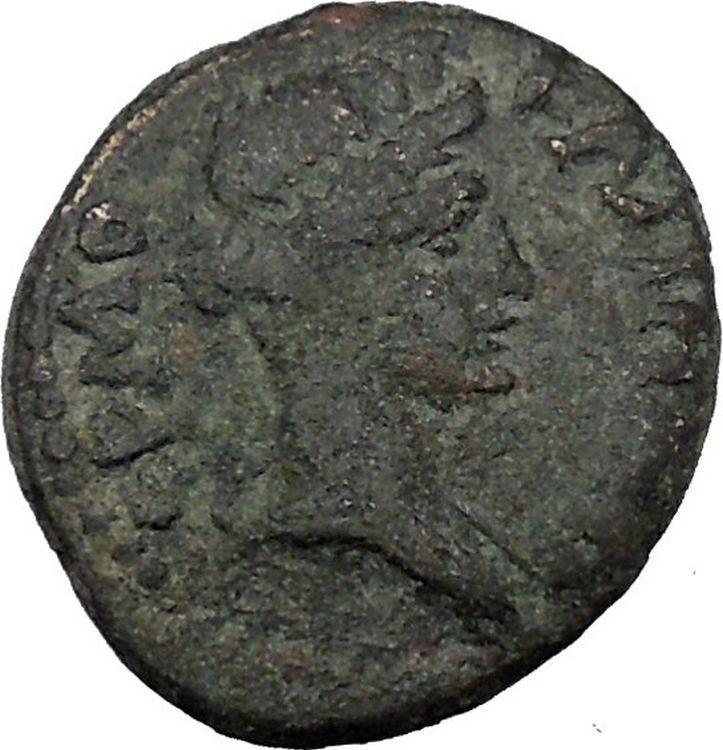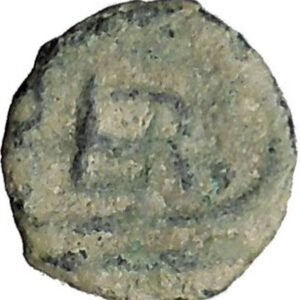|
Greek city of Amisos in Pontus
Bronze
20mm (7.60 grams) Struck under Mithradates VI the Great circa 105-90 B.C. or circa 90-85 B.C.
Reference: HGC 7, 241; SNG Black Sea 1147-1165; Sear 3643; B.M.C. 13.17, 40-41
Head of young Ares right, wearing crested helmet.
Sword in sheath; AMI – ΣOY across field; monograms in fields.
In mythology, Amisos was believed to be the original settlement of the Amazons. It was originally founded by Greeks from the cities of Phokaia and/or Miletos in circa 560 B.C. It was a flourishing Greek city on the Black Sea coast commanding an important trade route to the south. Amisos was under the control of the Achaemenid Empire, then re-settled by Athenians in the following century and they renamed the place Peiraeus. In subsequent times it played important historical roles as a city of the Kingdom of Bosporus. It was given the status of a free city under the Romans.
You are bidding on the exact item pictured, provided with a Certificate of Authenticity and Lifetime Guarantee of Authenticity.
 Ares is the Greek god of war. He is one of the Twelve Olympians, and the son of Zeus and Hera. In Greek literature, he often represents the physical or violent aspect of war, in contrast to the armored Athena, whose functions as a goddess of intelligence include military strategy and generalship. Ares is the Greek god of war. He is one of the Twelve Olympians, and the son of Zeus and Hera. In Greek literature, he often represents the physical or violent aspect of war, in contrast to the armored Athena, whose functions as a goddess of intelligence include military strategy and generalship.
The Greeks were ambivalent toward Ares: although he embodied the physical valor necessary for success in war, he was a dangerous force, “overwhelming, insatiable in battle, destructive, and man-slaughtering.” Fear (Phobos) and Terror (Deimos) were yoked to his battle chariot. In the Iliad his father Zeus tells him that he is the god most hateful to him. An association with Ares endows places and objects with a savage, dangerous, or militarized quality. His value as a war god is even placed in doubt: during the Trojan War, Ares was on the losing side, while Athena, often depicted in Greek art as holding Nike (Victory) in her hand, favored the triumphant Greeks.
Ares plays a relatively limited role in Greek mythology as represented in literary narratives, though his numerous love affairs and abundant offspring are often alluded to. When Ares does appear in myths, he typically faces humiliation. He is well known as the lover of Aphrodite, the goddess of love who was married to Hephaestus, god of craftsmanship, but the most famous story involving the couple shows them exposed to ridicule through the wronged husband’s clever device.
The counterpart of Ares among the Roman gods is Mars, who as a father of the Roman people held a more important and dignified place in ancient Roman religion for his agricultural and tutelary functions. During the Hellenization of a title=”Latin literature” href=”https://en.wikipedia.org/wiki/Latin_literature”> Latin literature, the myths of Ares were reinterpreted by Roman writers under the name of Mars. Greek writers under Roman rule also recorded cult practices and beliefs pertaining to Mars under the name of Ares. Thus in the classical tradition of later Western art and literature, the mythology of the two figures becomes virtually indistinguishable.

Mithridates VI or Mithradates VI (Greek: Μιθραδάτης), from Old Persian Mithradatha, “gift of Mithra”; 134-63 BC, also known as Mithradates the Great (Megas) and Eupator Dionysius, was king of Pontus and Armenia Minor in northern Anatolia (now Turkey) from about 120-63 BC. Mithridates is remembered as one of the Roman Republic’s most formidable and successful enemies, who engaged three of the prominent generals from the late Roman Republic in the Mithridatic Wars: Lucius Cornelius Sulla, Lucullus and Pompey. He was also the greatest ruler of the Kingdom of Pontus.
 Samsun is a city in northern Turkey, on the coast of the Black Sea, with a population of over 1 million. It is the capital city of Samsun Province and an important port. Samsun was founded as the colony Amisos (alternative spelling Amisus, Eis Amison – meaning to amisos took the name Samsunta or Samsus (Eis Amison – Samson – Samsounta) as in Greek + ounta “Greek toponomical suffix”. ) by settlers from Miletus in the 7th century BC. Samsun is a city in northern Turkey, on the coast of the Black Sea, with a population of over 1 million. It is the capital city of Samsun Province and an important port. Samsun was founded as the colony Amisos (alternative spelling Amisus, Eis Amison – meaning to amisos took the name Samsunta or Samsus (Eis Amison – Samson – Samsounta) as in Greek + ounta “Greek toponomical suffix”. ) by settlers from Miletus in the 7th century BC.
History
Samsun’s original name was Enete (from Hitits.) Samsun’s ideal combination of fertile ground and shallow waters attracted numerous traders. Greek colonists settled in the 6th century BC and established a flourishing trade relationship with the ancient peoples of Anatolia. At that time, Samsun was part of the Greek colony of Amisus. In the 3rd century BC, Samsun came under the expanded rule of the Kingdom of Pontus. The Kingdom of Pontus had been part of the empire of Alexander the Great. However, the empire was fractured soon after Alexander’s death in the 4th century BC. At its height, the kingdom controlled the north of central Anatolia and mercantile towns on the northern Black Sea shores.
The Romans took over in 47 BC, and were replaced by the Byzantines after the fall of Rome. In 1200 Samsun was captured by the Seljuks, to be later taken over by the İlhanlılar. Samsun was incorporated into the network of Genoese trading posts and was taken by the Ottomans in the beginning of the 15th century. Before leaving, the Genoese razed the town.
Atatürk founded the Turkish republic movement at Samsun and it served as its base during the Turkish War of Independence.
For more details on this topic, see Turkish War of Independence.
The city is both an Eastern Orthodox and a Roman Catholic titular see.
Geography
Samsun is situated between two river deltas which jut into the Black Sea. It is located at the end of an ancient route from Cappadocia: the Amisos of antiquity lay on the headland northwest of the modern city. To Samsun’s west, lies the Kızılırmak (“Red River”, the Halys of antiquity), one of the longest rivers in Anatolia and its fertile delta. To the east, lie the Yeşilırmak (“Green River”, the Iris of antiquity) and its delta.
 Pontus is a historical Greek designation for a region on the southern coast of the Black Sea, located in modern-day eastern Black Sea Region of Turkey. The name was applied to the coastal region and its mountainous hinterland (rising to the Pontic Alps in the east) in antiquity by the Greeks who colonized the area and derived from the Greek name of the Black Sea: Pontos Euxeinos (“Hospitable Sea”), or simply Pontos. Having originally no specific name, the region east of the river Halys was spoken of as the country Ἐν Πόντῳ En Pontōi, “on the [Euxeinos] Pontos”, and hence it acquired the name of Pontus, which is first found in Xenophon’s Anabasis. The extent of the region varied through the ages but generally extended from the borders of Colchis (modern Georgia) until well into Paphlagonia in the west, with varying amounts of hinterland. Several states and provinces bearing the name of Pontus or variants thereof were established in the region in the Hellenistic, Roman and Byzantine periods, culminating in the late Byzantine Empire of Trebizond. Pontus is sometimes considered as the home of the Amazons, with the name Amazon used not only for a city (Amasya) but for all of Pontus in Greek mythology. Pontus is a historical Greek designation for a region on the southern coast of the Black Sea, located in modern-day eastern Black Sea Region of Turkey. The name was applied to the coastal region and its mountainous hinterland (rising to the Pontic Alps in the east) in antiquity by the Greeks who colonized the area and derived from the Greek name of the Black Sea: Pontos Euxeinos (“Hospitable Sea”), or simply Pontos. Having originally no specific name, the region east of the river Halys was spoken of as the country Ἐν Πόντῳ En Pontōi, “on the [Euxeinos] Pontos”, and hence it acquired the name of Pontus, which is first found in Xenophon’s Anabasis. The extent of the region varied through the ages but generally extended from the borders of Colchis (modern Georgia) until well into Paphlagonia in the west, with varying amounts of hinterland. Several states and provinces bearing the name of Pontus or variants thereof were established in the region in the Hellenistic, Roman and Byzantine periods, culminating in the late Byzantine Empire of Trebizond. Pontus is sometimes considered as the home of the Amazons, with the name Amazon used not only for a city (Amasya) but for all of Pontus in Greek mythology.
Pontus became important as a bastion of Byzantine Greek and Greek Orthodox civilization and attracted Greeks from all backgrounds (scholars, traders, mercenaries, refugees) from all over Anatolia and the southern Balkans, from the Classical and Hellenistic periods into the Byzantine and Ottoman. These Greeks of Pontus are generally referred to as Pontic Greeks.
|





 Ares is the Greek god of war. He is one of the Twelve Olympians, and the son of Zeus and Hera. In Greek literature, he often represents the physical or violent aspect of war, in contrast to the armored Athena, whose functions as a goddess of intelligence include military strategy and generalship.
Ares is the Greek god of war. He is one of the Twelve Olympians, and the son of Zeus and Hera. In Greek literature, he often represents the physical or violent aspect of war, in contrast to the armored Athena, whose functions as a goddess of intelligence include military strategy and generalship.
 Samsun is a city in northern Turkey, on the coast of the Black Sea, with a population of over 1 million. It is the capital city of Samsun Province and an important port. Samsun was founded as the colony Amisos (alternative spelling Amisus, Eis Amison – meaning to amisos took the name Samsunta or Samsus (Eis Amison – Samson – Samsounta) as in Greek + ounta “Greek toponomical suffix”. ) by settlers from Miletus in the 7th century BC.
Samsun is a city in northern Turkey, on the coast of the Black Sea, with a population of over 1 million. It is the capital city of Samsun Province and an important port. Samsun was founded as the colony Amisos (alternative spelling Amisus, Eis Amison – meaning to amisos took the name Samsunta or Samsus (Eis Amison – Samson – Samsounta) as in Greek + ounta “Greek toponomical suffix”. ) by settlers from Miletus in the 7th century BC. Pontus is a historical Greek designation for a region on the southern coast of the Black Sea, located in modern-day eastern Black Sea Region of Turkey. The name was applied to the coastal region and its mountainous hinterland (rising to the Pontic Alps in the east) in antiquity by the Greeks who colonized the area and derived from the Greek name of the Black Sea: Pontos Euxeinos (“Hospitable Sea”), or simply Pontos. Having originally no specific name, the region east of the river Halys was spoken of as the country Ἐν Πόντῳ En Pontōi, “on the [Euxeinos] Pontos”, and hence it acquired the name of Pontus, which is first found in Xenophon’s Anabasis. The extent of the region varied through the ages but generally extended from the borders of Colchis (modern Georgia) until well into Paphlagonia in the west, with varying amounts of hinterland. Several states and provinces bearing the name of Pontus or variants thereof were established in the region in the Hellenistic, Roman and Byzantine periods, culminating in the late Byzantine Empire of Trebizond. Pontus is sometimes considered as the home of the Amazons, with the name Amazon used not only for a city (Amasya) but for all of Pontus in Greek mythology.
Pontus is a historical Greek designation for a region on the southern coast of the Black Sea, located in modern-day eastern Black Sea Region of Turkey. The name was applied to the coastal region and its mountainous hinterland (rising to the Pontic Alps in the east) in antiquity by the Greeks who colonized the area and derived from the Greek name of the Black Sea: Pontos Euxeinos (“Hospitable Sea”), or simply Pontos. Having originally no specific name, the region east of the river Halys was spoken of as the country Ἐν Πόντῳ En Pontōi, “on the [Euxeinos] Pontos”, and hence it acquired the name of Pontus, which is first found in Xenophon’s Anabasis. The extent of the region varied through the ages but generally extended from the borders of Colchis (modern Georgia) until well into Paphlagonia in the west, with varying amounts of hinterland. Several states and provinces bearing the name of Pontus or variants thereof were established in the region in the Hellenistic, Roman and Byzantine periods, culminating in the late Byzantine Empire of Trebizond. Pontus is sometimes considered as the home of the Amazons, with the name Amazon used not only for a city (Amasya) but for all of Pontus in Greek mythology.




